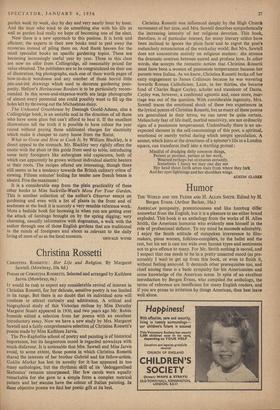Christina Rossetti
IT would be rash to expect any considerable revival of interest in Christina Rossetti, for her delicate, sensitive poetry is too limited in its range. But there is no doubt that its individual note will continue to attract curiosity and admiration. A critical and biographical study of this Victorian recluse by Miss Dorothy Margaret Stuart appeared in 1930, and two years ago Mr. Robin Ironside edited a selection from her poems with an excellent introductory essay. Now we have a new study by Mrs. Margaret Sawtell and a fairly comprehensive selection of Christina Rossetti's poems made by Miss Kathleen Jarvis.
The Pre-Raphtelite school of poetry and painting is of historical importance, but its languorous mood is regarded nowadays with much disfavour. It is noticeable that Mrs. Sawtell and Miss Jarvis avoid, to some extent, those poems in which Christina Rossetti shared the interests of her brother Gabriel and his fellow-artists. Goblin Market has lost its novelty for it has appeared in too many anthologies, but the rhythmic skill of its `dedoggerelised Skeltonics' remains unsurpassed. Her few carols were equally remarkable for she gave to a simple form a complex metrical pattern and her stanzas have the colour of Italian painting. In these objective poems we find her poetic gift at its best. Christina Rossetti was influenced deeply by the High Church movement of her time, and Mrs. Sawtell describes sympathetically the increasing intensity of her religious devotion. This book, therefore, is of particular interest, for many literary critics have been inclined to ignore the plain facts and to regret the poet's melancholy renunciation of the workaday world. But Mrs. Sawtell does not concentrate entirely on religious matters : she stresses the dramatic contrast between sacred and profane love. In other words, she accepts the romantic notion that Christina Rossetti must have been a woman of passionate temperament because her parents were Italian. As we know, Christina Rossetti broke off her early engagement to James Collinson because he was wavering towards Roman Catholicism. Later, in her thirties, she became fond of Charles Bagot Cayley, scholar and translator of Dante.
Cayley was, however, a confirmed agnostic and, once more, mar- riage was out of the question: With considerable ingenuity, Mrs. Sawtell traces the emotional shock of these two experiences in the lyrical poems of Christina Rossetti, but as many of these poems are generalised in their terms, we can never be quite certain. Melancholy fear of life itself, morbid sensitivity, are not ordinarily signs of a passionate temperament. Undoubtedly there is an un- expected element in the self-communings of this poet, a spiritual, emotional or merely verbal daring which tempts speculation. A sonnet, which hints at the dreariness of a spinster's life in a London square, can transform itself into a startling protest : Mindful of drudging daily common things, Patient at pastime, patient at her work, Wearied perhaps but strenuous certainly. Sometimes I fancy we may one day see Her head shoot forth seven stars from where they lurk
And her eyes lightnings and her shoulders wings.
AUSTIN CLARKS


































 Previous page
Previous page